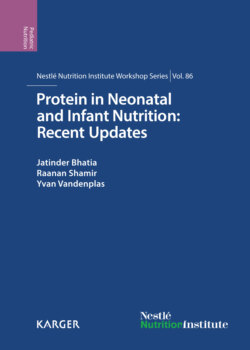Читать книгу Protein in Neonatal and Infant Nutrition: Recent Updates - Группа авторов - Страница 8
На сайте Литреса книга снята с продажи.
Foreword
ОглавлениеThere are many global changes today that influence the health of future generations; many arise from economic challenges and changes in social and cultural norms. The most prevalent topic of discussion is that of noncommunicable diseases, including obesity, diabetes and cardiovascular diseases.
Over the last few years, our Nestlé Nutrition Institute (NNI) workshops have focused on many of the major issues of child nutrition, but in our most recent workshop, we decided to take a slightly different approach and discuss the role of nutrition in its nontraditional sense, i.e. beyond its role as a supplier of energy and nutrients.
The workshop looked at recent updates in ‘Protein in neonatal and infant nutrition’ and took place in Beijing, China, a country with a number of identified areas where science and nutrition, academia and the private sector can work together to help solve public health concerns, on May 24-27, 2015.
Protein was selected as the central theme of the 86th workshop program due to its vital role in growth and development and its ability to ‘program’ healthy growth by influencing gene methylation for positive long-term health outcomes. The understanding of such a mechanism is critical to support and improve the health of the next generation in the short and long term.
We have chosen an incredible international faculty led by three chairpersons, Prof. Yvan Vandenplas (Belgium), Prof. Raanan Shamir (Israel) and Prof. Jatinder Bhatia (USA), who put the scientific program together.
The first session with Yvan Vandenplas (Head of the Department of Pediatrics, Universitair Ziekenhuis Brussel) was about the role of hydrolyzed proteins in infant feeding and the evidence-based benefits of its use in nonbreastfed infants at risk of allergy and infants with functional gastrointestinal disorders.
The second session, chaired by Prof. Raanan Shamir (Institute of Gastroenterology, Nutrition and Liver Diseases, Schneider Children’s Medical Center, Israel, and Professor of Pediatrics, Sackler Faculty of Medicine), focused on human milk and its potential alternatives in the feeding of healthy term infants. It was clearly stated that there is no comparable alternative to human milk. In a situation where breastfeeding is no longer possible, the protein quality and quantity in the infant formula should be the decision-making factor in the choice of the right food for that infant.
The third session with Prof. Jatinder Bhatia (Professor and Chief of the Division of Neonatology, Department of Pediatrics, Augusta University) was dedicated to preterm infants, their nutrition needs and physiological capacities to ingest adequate amounts of protein for appropriate growth and development. There is still a lot of research work to be done in this area, but it is very clear that proteins in the feeding of this category of infants play a critical role in both the short- and long-term health outcome of these infants.
We would like to thank all participants for their contributions to the formal and informal discussions during the workshop. We believe that such an event helps to create additional professional relations in areas of common interest in order to shape the future together.
It is time that we move from focusing purely on science and observations to finding practical solutions. Events, such as this workshop, help to pave the way for future action.
Finally, we would like to congratulate all those involved in the organization of this workshop - both at global and at regional level - and give special thanks to Dr. Lawrence Li and his team for their wonderful hospitality and professionalism.
Dr. Natalia Wagemans
Head
Nestlé Nutrition Institute
Vevey, Switzerland
